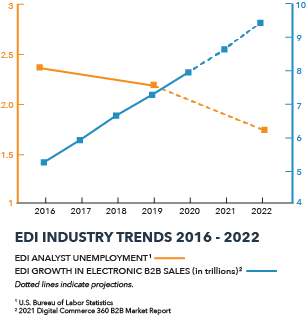
With supply chains still not flowing with the efficiency and visibility today’s globally connected economy demands, our clients are telling us they need EDI consultants at all levels who can jump in with minimal supervision.
At the same time, the urgent demand for qualified EDI and B2B talent doesn’t mean integration managers are willing to settle for warm bodies. Nor should they.
In this article, we’ll share the five critical questions to ask when evaluating EDI consulting and staffing partners. Answering them upfront will help you avoid a bad fit and find the skills you need for a successful project.
But first, let’s take a quick look at what’s driving scarcity in the EDI talent market.
Factors Driving Demand for EDI Consultants
Coming out of the pandemic, in-house integration and EDI teams have contracted, due mainly to retirements and resignations.
But it’s also fair to say that EDI’s resilience and continued growth contribute to tight supply.
Despite the periodic predictions of EDI’s death at the hands of technology such as APIs, EDI accounted for 78% of all electronic B2B sales in 2021, or $7 trillion in annual sales. EDI as a percentage of all electronic B2B sales grew by an average of 11% per year between 2017 and 2020.
At the same time, unemployment for EDI folks, like other IT segments, has plummeted. For example, unemployment for EDI analysts between 2016 and 2019 fell an average of 3% per year.
While a downturn could change the trajectory of these trends, current indicators point to rising competition for the best and most seasoned EDI professionals (see infographic).

Using the most recent data available, we took the respective averages from each data set and created trendlines through 2022. The projections align with customer feedback regarding the lack of qualified, full-time EDI candidates for open positions.
Given these dynamics, turning to an EDI consulting partner is a proven way to access the integration talent you need for comprehensive projects such as EDI/B2B integration platform migrations as well as day-to-day tasks that need attention from skilled hands.
Questions to Ask When Considering an EDI Consulting Partner
Choosing the right EDI consulting partner can seem daunting, but answering these questions will give you the comfort and confidence you need to make the right choice for your team and your company.
1. Do they listen?
Basic as it sounds, listening is the skill you most want your EDI consulting partner to have.
More than one client has told us they chose Remedi because we delivered a proposal that addressed their needs, unlike other vendors that pushed the solution with the highest margins, or the maximum level of effort.
Regardless of the firm you choose, avoid any partner who seems more interested in the quick kill or inflating the scope than supporting your long-term success.
2. Do they give you the option of approving the resources?
Many managed services and EDI outsourcing firms rely on a business model that precludes client approval of the proposed resources. Usually, this is because they don’t offer dedicated resources. See next question.
3. Will they provide dedicated resources?
In our experience, making a good match is as much about the right technical skills as it is being able to trust that your EDI consultant partner understands why resource continuity is important to the project’s success. This is especially true for long-term managed EDI services engagements.
4. Can their candidates document the skills they claim to have?
You bring in EDI consultants when your in-house staff is unable to do or is unfamiliar with what needs to be done, and what needs to be done is urgent.
For example, when the ASN is part of the project requirement, you’ll want to know if Jack, the hypothetical resource candidate, has touched an 856 since Y2K was a thing. So it’s entirely fair of you to ask to see and hear some evidence of the candidate’s experience with different formats, platforms, and use cases.
5. Are their candidates team players?
Assuming parity in technical knowledge, soft skills like written and verbal communication set effective EDI consultants apart from the pack. To be successful, it’s critical for the consultant to integrate with the in-house team. Being able to communicate well fosters that bond.
Equally important, however, is the consultant’s attitude. The ones who are committed to helping the team succeed as much as they are to knocking out their own tasks will add the most value to your projects.
Common Mistakes to Avoid with an EDI Consulting Partner
Vendor Lock-In:
You never want to find yourself saying “Yes, the partner is painful to work with but the process of finding and moving to another one feels more painful.” You control your integration environment, solutions, and resources— not the other way around.
Avoid a partner who insists on locking you into long-term contracts that shift too much control away from your team.
Unrealistic Ramp Up:
Allow enough time for the partner to discover the interconnections and the hidden conflicts between databases, operating systems, business processes, and applications in the integration ecosystem. Otherwise, both sides are going to be frustrated, and the process— and possibly the outcome— will suffer.
Also, you should assign a point person within your environment who can create a process to remove obstacles for your partner as they arise and build a solid relationship with consultants.
For example, the point person is there to provide priority guidance, make internal staff introductions, and arrange critical access to company networks, databases, and software vendor portals.
Bundling EDI and Related Data Integration Services within a Master IT Services/ Outsourcing Agreement:
The problem with “all-you-can-eat” IT outsourcing regarding EDI and related disciplines is a lack of qualified expertise.
While the initial fee can look appealing, too often what the customers receive is unacceptable response times, poor quality service, or blown budgets when the vendor realizes they failed to scope and staff to address the actual needs of the customer.
To avoid this type of chaos, hire a partner for whom managed EDI services or EDI outsourcing is a core competency, not an afterthought.
See Managed EDI Strategies for a Post-Pandemic Economy for more tips on getting the most value from adding outside EDI consultants to your team— including a special section that explains what you should expect to pay for managed EDI and B2B integration services.
Want to Discuss EDI Consulting Solutions?
Project consulting? Staff supplementation? Managed EDI services? EDI outsourcing? If you’re facing EDI staffing shortfalls and you’re not sure which option makes the most sense for you, talk to a Remedi EDI talent expert.


